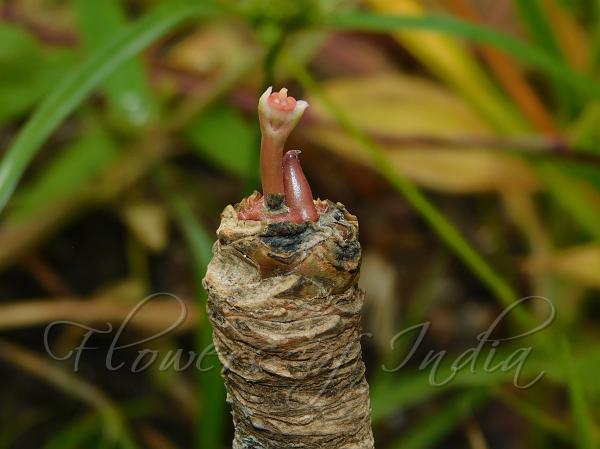|
| Stemless Spurge |
|

|

| File size | 606498 |
| Original date | 9/1/23 8:28 AM |
| Resolution | 4608 x 3456 |
| Flash | Flash fired |
| Focal length | 32.7mm |
| Exposure time | 1/400s |
| Aperture | 5.4 |
| Focus Distance | |
| Metering Mode | Multi-segment |
| Camera make | NIKON |
| Camera model | COOLPIX B500 |
| Sensor type |
|
|
|
|
Photo: |
Botanical name: Euphorbia fusiformis Family: Euphorbiaceae (Castor family)
Synonyms: Euphorbia acaulis, Euphorbia humilis
Synonyms: Euphorbia acaulis, Euphorbia humilis
Stemless Spurge is a succulent herb, rootstock
spindle-shaped, buried in the ground, 12-85 cm long and 3-5.5 cm in
diameter. Leaves are hairless, appearing after flowers, fleshy,
numerous, arching, mostly irregular in shape, broadly to narrowly
lanceshaped to inverted-lanceshaped, 12-25 cm long and 1.5-5 cm broad,
blunt, with a reddish prominent midrib on the lower surface,mostly
green, with sharp reddish, slightly crispate or wavy margins;
leaf-stalk up to 5 cm long. Flowers are borne in yellow-green cymes,
3.5-4.5 cm long, hairless, flower-cluster-stalk three times branched,
cyathia bisexual, yellow, bracts green, cyathial glands oblong, yellow,
male flowers appear before female, stamens 3 mm long, pollen yellow,
female flower with styles 3, fused to the middle for 1.5 to 2.0 mm,
then free for 2.0 mm, bifid. Gynophore erect to 12 mm, capsule 7.5 to 8
mm in diameter, cocci compressed, slightly rounded, hairless, greenish
in colour; seeds ovate, smooth, very dark grey in colour. Stemless
Spurge is endemic to India and Nepal.
Medicinal uses: In several regions of India
and Nepal, this rare geophytic Euphorbia is used for its benefits as
folk medicine. Latex-based extract from its roots is utilized to
relieve muscular and arthritis-related pain. By applying leaf -paste to
the forehead, headaches and fever can be cured. Other illnesses such as
diarrhoea, eczema, and liver disorders are treated using root's latex.
In a few regions, people use it as an antidote to snake bites. Its
Latex can cause irritation and etching to sensitive skin and may
seriously harm the eyes if not handled cautiously.
In several regions of India
and Nepal, this rare geophytic Euphorbia is used for its benefits as
folk medicine. Latex-based extract from its roots is utilized to
relieve muscular and arthritis-related pain. By applying leaf -paste to
the forehead, headaches and fever can be cured. Other illnesses such as
diarrhoea, eczema, and liver disorders are treated using root's latex.
In a few regions, people use it as an antidote to snake bites. Its
Latex can cause irritation and etching to sensitive skin and may
seriously harm the eyes if not handled cautiously.
Medicinal uses:
 In several regions of India
and Nepal, this rare geophytic Euphorbia is used for its benefits as
folk medicine. Latex-based extract from its roots is utilized to
relieve muscular and arthritis-related pain. By applying leaf -paste to
the forehead, headaches and fever can be cured. Other illnesses such as
diarrhoea, eczema, and liver disorders are treated using root's latex.
In a few regions, people use it as an antidote to snake bites. Its
Latex can cause irritation and etching to sensitive skin and may
seriously harm the eyes if not handled cautiously.
In several regions of India
and Nepal, this rare geophytic Euphorbia is used for its benefits as
folk medicine. Latex-based extract from its roots is utilized to
relieve muscular and arthritis-related pain. By applying leaf -paste to
the forehead, headaches and fever can be cured. Other illnesses such as
diarrhoea, eczema, and liver disorders are treated using root's latex.
In a few regions, people use it as an antidote to snake bites. Its
Latex can cause irritation and etching to sensitive skin and may
seriously harm the eyes if not handled cautiously. | Identification credit: Nishant Chauhan | Photographed in Hamirpur, Himachal Pradesh. |
• Is this flower misidentified? If yes,